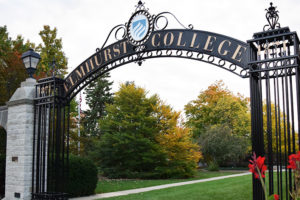
Roman Catholic bishops have swerved away from the full depth of Catholic social teachings in their overemphasis on fighting abortion, same-sex marriage and contraception, said theologian Lisa Sowle Cahill in a recent lecture at Elmhurst College.
For the church to regain a proper perspective on its moral teachings, she said, the Catholic faithful need to take a more active role in shaping the world in accordance with their theological traditions.
Cahill, a lifelong Catholic and outspoken member of the church’s liberal wing, is the J. Donald Monan, S.J., Professor of Christian Ethics at Boston College. She has published widely on the issues of theological ethics, just-war theory, sex and gender questions, and bioethics. In 2008 she worked with presidential candidate Barack Obama’s National Catholic Advisory Committee.
Presenting Elmhurst’s annual Cardinal Bernardin Lecture on November 14, Cahill made what she called “the ethical case for supporting the Affordable Care Act,” the signature domestic achievement of President Obama’s first administration, and carrying it to full implementation, even though the public is still divided on the law.
Like the rest of the general public, “we in the Catholic Church are divided on health care reform,” she said, “with abortion and reproductive health issues on one side, and covering everyone with services on the other side.”
Yet if one considers the full panoply of Catholic social teachings since the late 19th century, there ought to be room for a less contentious consensus, she argued. Cardinal Bernardin, archbishop of Chicago from 1982 until his death in 1996, promulgated “the consistent ethic of life,” which sought to create a space for civil conversation between pro-life Catholics and social-justice Catholics. He formed the Catholic Common Ground Initiative, of which Cahill is a member, to unite people of different points of view.
The condition of the U.S. health system shouldn’t be regarded only as a thorny political or economic issue; it also can be seen as a vehicle for carrying Catholic social teachings into the world, Cahill suggested. Catholic ethics define health care as an “essential human right,” contributing to the dignity of the person and the common good. Health care should serve the needs of all, including the poor, the elderly, the unborn and immigrants, whether legal or illegal, she said.
The U.S. Catholic bishops, however, have altered the hierarchy of Catholic values to focus almost exclusively on abortion, contraception and issues of human sexuality, including gay marriage. Furthermore, Cahill argued, they have used the reform law’s requirements on funding contraception as a lever to assert that the Obama administration is restricting their freedom of religion.
In so doing, they have moved well beyond what the public supports and what lay Catholics think, Cahill said. Polling shows that most people do not believe religious liberty is under threat, and that Catholics are supportive of the law’s contraception coverage requirements.
The bishops’ campaign on this issue “is not getting traction among Catholics or other voters,” she pointed out, and may turn out to be politically imprudent.
Citing statistics demonstrating that the U.S. abortion rate, highest in the industrialized world, is linked to poverty, lack of education and inadequate access to health services, Cahill said that reducing abortion “calls on us to engage in the art of the possible.”
“There is a role for Catholic anti-abortion advocates in being equally anti-poverty and pro-healthcare reform,” she said. To be in solidarity with the goal of trying to reduce abortion “requires more than trying to make abortion illegal.” The goal should be to enhance the availability, sustainability and quality of health care, so that fewer women would consider abortion.
From this perspective, U.S. Catholic women religious “are the best prophets” on health reform, not the bishops, she argued.
“Why do we keep going back to the bishops? Why don’t we exercise leadership on our own behalf?” Cahill wondered. “Do the Vatican and bishops really want a smaller church” in which broader Catholic teachings are lost?
“I am disillusioned,” she concluded. “We need a more broad-based Catholicism.”